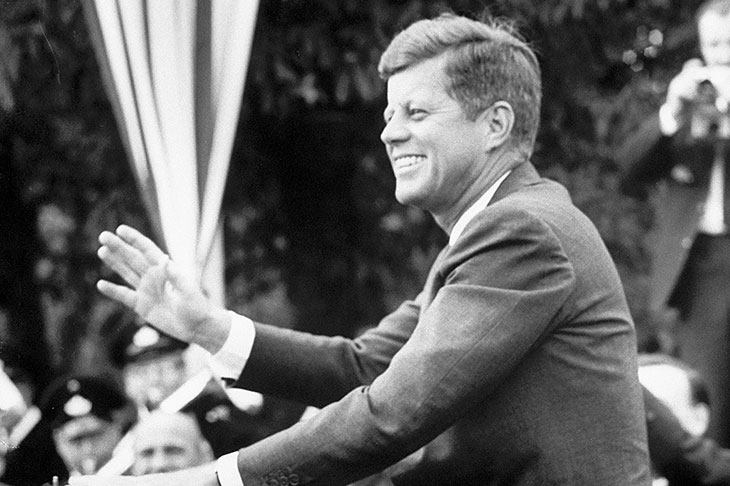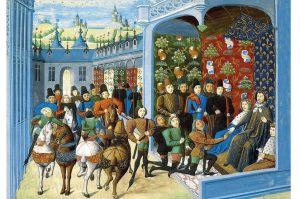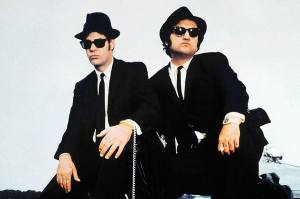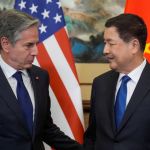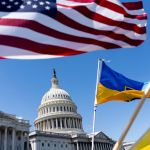It’s easy to forget that John F. Kennedy lived such a short life. At 43, he was the second youngest president in history; when he died, he was younger than Barack Obama was in 2009. Kennedy’s presidency was brief —‘a thousand days,’ as the historian and Kennedy confidant Arthur Schlesinger Jr memorably put it — but included some of the most intensively covered episodes in modern history, from the civil rights movement to the Cuban Missile Crisis.
As a result, JFK has not lacked for attention. So, what more is there to say about him? A good deal, it turns out. Kennedy is familiar yet mysterious, and therefore difficult to get come to terms with — perhaps this is why he’s been given a surprisingly wide berth by presidential biographers. We’ve never really understood him. This most famous of presidents remains one of the most enigmatic. His life has been chronicled, to be sure, but not as it should be, and nothing like his contemporaries Lyndon B. Johnson and Richard Nixon.
This is mostly because Kennedy is shrouded in myth, for which his inner circle bears much of the responsibility. They mythologized him at virtually every stage of his career, no more so than in the wake of his assassination, in 1963, when the idea took hold that Kennedy’s Washington was an American Camelot (inspired by the Broadway musical, strangely but fittingly, rather than the Arthurian legend). The Kennedy family’s susceptibility to tragedy — three of JFK’s siblings, as well as his son, died young, as suddenly and violently as he did himself — adds to his mythic dimensions.
His glamorous lifestyle has also fed the myth: it’s difficult to accept someone as a mere politician whose numerous lovers included Marilyn Monroe. He may not have been the first celebrity president, but he was the first who looked like one. ‘We love you on TV!’ a surging crowd of young women screamed at then-Sen. Kennedy in 1956. ‘You’re better than Elvis Presley!’ Yet as Fredrik Logevall points out in his utterly absorbing biography, the first of a projected two volumes, Kennedy deserves our attention not simply because he was a celebrity, but because his celebrity is a key to unlocking modern American history itself.
It is a testament to Logevall’s talents as a writer and historian that he’s able to demystify JFK the legend but keep John F. Kennedy the person interesting. He allows us to delve into the world of the Kennedy family and be swept along by the story without getting carried away by the myth. Logevall is an elegant stylist, and although he’s in no hurry to get us to the White House, his book never feels slow. JFK is biography at its very best, with Logevall acting as an expert guide without getting in the reader’s way.
Kennedy was born in Boston in 1917 to a prominent Irish Catholic family. His father, Joseph Kennedy, made his fortune in banking before becoming a power broker in Hollywood and then, infamously, US ambassador to Britain and a cheerleader for appeasement. Joe Kennedy Jr, the eldest of nine children, was the heir apparent before the B-24 bomber he was piloting exploded over the Suffolk countryside in 1944. From then on, JFK carried the family torch, though Logevall rightly stresses, contrary to previous assumptions, that his destiny was not solely the work of his manipulative father.
[special_offer]
At its heart, Logevall’s JFK is a story about World War Two, which takes up roughly half the book. This is fitting, for the war made JFK who he was. Before his older brother’s death, Kennedy had served as his father’s aide in London, witnessing the Nazis’ march to war, the failure of Neville Chamberlain and the resurrection of Winston Churchill — a young JFK was in the Westminster gallery to hear his hero’s early wartime speeches. He published an account of appeasement, Why England Slept, that became a bestseller on both sides of the Atlantic. He nearly died in 1943 when a Japanese destroyer rammed his naval patrol boat in the South Pacific; he was decorated for heroism in rescuing his shipwrecked crew.
After the war, Kennedy increasingly looked the part of a Hollywood star, despite his chronically poor health (a subject Logevall treats especially well). The stage — the rising power and prosperity of ‘the American century’ — was now set for a remarkable political career. By this point in Logevall’s biography, JFK is less mythical and more familiar and personable, the phenomenon he’d become more easily understood.
This first volume ends in 1956, with Kennedy a rising star in the Democratic party and priming himself for a run at the presidency in 1960. Such are Logevall’s storytelling powers that, even though we all know the outcome, it still feels like a cliffhanger.
This article was originally published in The Spectator’s UK magazine. Subscribe to the US edition here.
